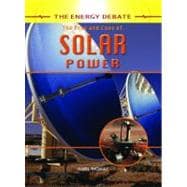Solar Panels: What You Should Know
>> Wednesday, September 24, 2008
Imagine living in an area with plenty of sunshine. The vast majority seek ways to prevent or block out the sun, viewing it as something to avoid. But the sun produces one of the most abundant forms of energy, renewable energy, that is all over the world and it is free. Instead of “hiding” from the sun, we can use ways to capture that energy and put it to good use. One option is through the use of solar panels.
This discussion will not focus on the “how does a solar panel work” but instead will answer some questions concerning is it right for me? Is it right for my home? This will help save time and money unnecessarily spent.
The 1st thing you must do is to contact your local building departments and local power company. At your building department, you are inquiring whether there are codes and ordinances in place. Are there requirements that must be met for solar panels? Next, your power company. Here you will want to ask if there are any credits, rebates or incentives for installing solar panels. Inquire if the area in which you live is feasible. Even ask them for a few local people that are using solar panels.
With all requirements satisfied, next gather up the information you will need. The internet is filled with free information. But, if you are planning on constructing one yourself, I am recommending that you research and purchase a “how to” manual from someone with experience building homemade solar panels. You want the author to be the builder as well. One who has “been there and done that”. If you run into a snag while building, you will have support from someone who knows how to get you un-jammed. These instruction books are easy, step by step instructions, complete with diagrams, for the novice as well the more advanced. One more plug: by purchasing from an author/builder, you help support the endeavors taken to bring you the knowledge gained by experience. Basically, you are paying for their printed knowledge that will benefit you for years to come.
If you have obtained the proper manuals, the next step is gathering the materials listed and the tools required. You will probably find that you have most of the tools and the materials in abundance in your area. Because of the interest in renewable energy and advanced technologies, you can build your own solar panel system in a day.
Once completed and in operation, you may find the use of this free energy has reduced your dependence on non-renewable energy. That saves you money. In fact, studies show an 80% decrease in the amount of energy purchased from local utilities by using solar panels. This translates into huge savings on your part. Not to mention playing your part in helping to reduce energy waste and pollution.
Now a word of caution. In addition to the many benefits of using solar energy, there are also warnings. There is an inherit danger in all energy. Concerning the sun, take safety measures in protecting your eyes and your skin. Solar energy can cause irreparable eye damage from reflection of the sun if the panels are not handled properly and respectfully. If your solar panel system is for generating electricity, use caution here as well. For more information on homemade solar panels,I recommend you purchase one of these books on this blog. You help support them as they extend their experience and knowledge to you that will benefit you years to come. Hey, thanks.





